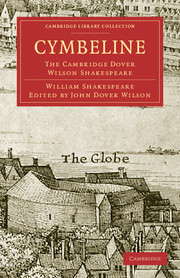INTRODUCTION
Published online by Cambridge University Press: 05 October 2010
Summary
Date and Authenticity
The first recorded mention of Cymbeline is by Simon Forman. The performance he describes is not likely to have been the first, but we cannot be sure how much earlier the play is. The commonly accepted dates for Shakespeare's ‘romances’ are still those proposed by Chambers: Cymbeline, 1609–10; The Winter's Tale, 1610–11; The Tempest, 1611–12 ; but The Tempest is the only one that is at all securely dated, in 1611. Even the relative dating of the other two is uncertain, though it is reasonable to associate the greater artistic assurance of The Winter's Tale with a later date, which is also supported by the fact that Shakespeare undoubtedly knew the Boccaccio source of Cymbeline when he wrote The Winter's Tale. I think Chambers's date for The Winter's Tale may well be a year too late. There is a fairly close verbal parallel between The Winter's Tale, 4. 4. 129–32 and Philaster, 4. 4. 2–6, which seems to me most easily explained as an echo of the former by the latter; and Philaster is not later than 8 October 1610. (Parallels which Nosworthy cites between Philaster and Cymbeline are less persuasive, though the mention in Philaster, 4. 5. 115 of ‘Augustus Caesar’, who has nothing to do with the subject, may, as he suggests, be due to a recollection of Cymbeline.) If The Winter's Tale is 1609–10, then perhaps Cymbeline is 1608–9.
- Type
- Chapter
- Information
- CymbelineThe Cambridge Dover Wilson Shakespeare, pp. xi - xliiPublisher: Cambridge University PressPrint publication year: 2009First published in: 1960

